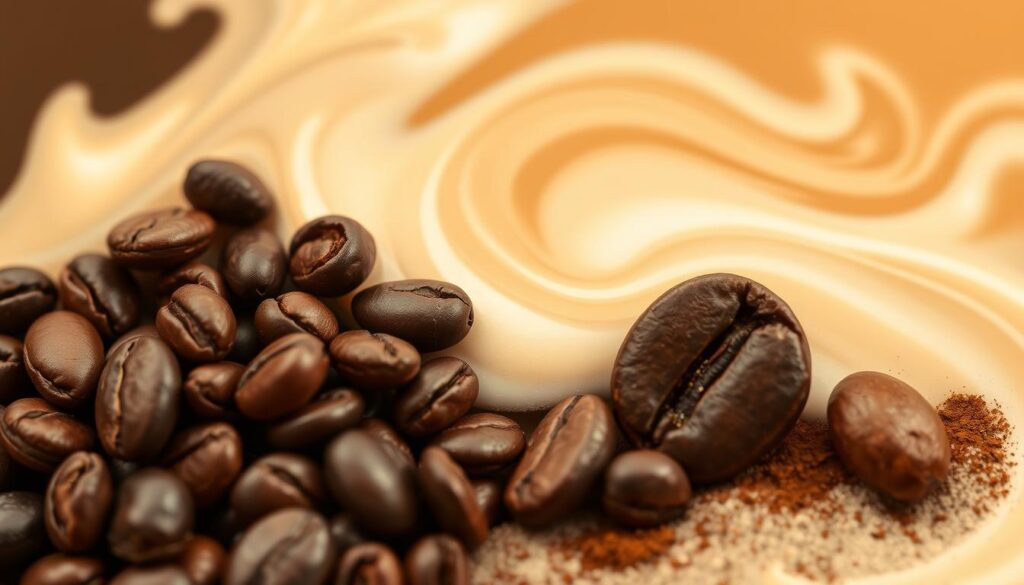Coffee lovers often wonder about the differences between black coffee and white coffee. These two types come from the same beans but have different tastes and making methods. This guide will dive into the main differences, including how they’re made, their flavors, caffeine levels, and health effects. We aim to help you choose based on what you like and your lifestyle.
Key Takeaways
- Black coffee and white coffee are two distinct coffee types with unique processing methods and flavor profiles.
- The color difference is primarily due to the degree of roasting and the degree of oxidation of the coffee beans.
- Black coffee is typically bolder, more intense, and has a higher caffeine content compared to white coffee.
- White coffee is known for its delicate, light, and sometimes sweeter taste, with a lower acidity level.
- Both coffee types offer distinct health benefits and considerations, making it important to understand your preferences and needs.
Understanding Basic Coffee Types and Their Characteristics
To truly appreciate the differences between black and white coffee, we need to understand coffee basics. We must look at the chemical makeup of coffee beans and how processing and roasting change them. These steps shape the unique qualities of different coffee types.
The Chemical Composition of Coffee Beans
Coffee beans are full of complex compounds that give them their aroma and flavor. The coffee bean composition includes caffeine, chlorogenic acids, and more. Knowing about these compounds helps us see why different coffees are unique.
How Processing Methods Affect Coffee Color
The coffee processing methods greatly affect the color of roasted beans. Things like fermentation, drying, and whether the bean’s outer layers are kept can change the color. This can make coffee range from deep, rich tones to lighter, more delicate shades.
The Role of Roasting in Coffee Classification
Coffee roasting is key in changing green beans into the coffee we love. It not only affects the coffee classification but also brings out the bean’s best qualities. Roasting levels, from light to dark, change the coffee’s aroma, body, and taste.
By looking into these coffee basics, we can understand what makes them different. This helps us appreciate coffee more deeply.

The Origins and Evolution of Black Coffee
It has a long history, starting in Ethiopia and the Arabian Peninsula.It is known for its strong taste. It has become a big part of many cultures around the world.
Kaldi, a goatherd, is said to have found coffee. He noticed his goats got more energy after eating coffee berries. This event started the journey of traditional coffee brewing and coffee culture.
Over time, how people made and drank black coffee changed. Different places like Turkey and Japan created their own ways of making coffee. These traditions show how black coffee brings people together and inspires many.
Now, it is still loved by many. Its history and many ways of making it fascinate coffee lovers everywhere. The story of it shows how a simple drink can change lives and cultures.

Exploring White Coffee and Its Unique Properties
White coffee is a lesser-known cousin of black coffee. It has a unique flavor that stands out. Unlike the black one, white is made with a special process that gives it a delicate taste.
What Makes Coffee “White”
The “whiteness” of white coffee comes from its roasting. It’s roasted at a lower temperature for less time. This keeps the beans’ natural flavors, making the coffee lighter and more subtle.
Regional Variations of White Coffee
White coffee has a rich history and many regional flavors. Malaysian white coffee is known for its creamy taste and light color. Other places like Hawaii and Yemen have their own white coffee styles.
Popular White Coffee Preparations
- White Coffee Latte: A smooth mix of white coffee and steamed milk, topped with cocoa or cinnamon.
- White Coffee Iced: A cool version of white coffee, served over ice with sweetener or syrups.
- White Coffee Espresso: A strong shot of white coffee, enjoyed on its own or in drinks.
- White Coffee Pour-Over: A manual brewing method that highlights white coffee’s flavors, making a balanced cup.
White coffee is a unique choice for coffee lovers. Its distinct taste and many regional flavors make it a fascinating journey.
| Region | Characteristics |
|---|---|
| Malaysian White Coffee | Creamy, milk-like flavor, light golden color |
| Kona White Coffee | Delicate, nuanced flavor, bright acidity |
| Yemeni White Coffee | Earthy, complex notes, medium-bodied |
Caffeine Content: Black vs. White Coffee Comparison
The caffeine in coffee can vary a lot between them. The roasting process is key in deciding how much caffeine each type gets.
Black coffee usually has more caffeine than white coffee. This is because black coffee beans are roasted at higher temperatures for longer. This process pulls out more caffeine from the beans.
| Coffee Type | Caffeine Content (per 8 oz cup) | Coffee Strength | Stimulant Effects |
|---|---|---|---|
| Black Coffee | 95-200 mg | Stronger | More pronounced |
| White Coffee | 55-120 mg | Milder | Less intense |
White coffee, on the other hand, is made with beans roasted at lower temperatures. This keeps more of the original caffeine, making it milder. It’s perfect for those who don’t like strong caffeine or want a softer caffeine kick.
The amount of caffeine can change based on the coffee bean type, how it’s brewed, and personal taste. But, in general, black coffee has more caffeine than the white one .
Taste Profile Differences Between Black and White Coffee
Coffee lovers are always curious about the taste differences between black and white coffee. Black coffee is known for its bold flavors, while white coffee is more delicate. Let’s look at how these two types of coffee differ in flavor, aroma, and aftertaste.
Flavor Notes and Intensity Levels
Black coffee has a richer taste due to its long roasting process. You might taste dark chocolate, caramel, or smokiness. White coffee, on the other hand, is more subtle, with notes of nuts or flowers.
Aroma Characteristics
The roasting method affects the aroma of both. Black coffee smells earthy, with hints of nuts or bitterness. White coffee has a lighter scent, often floral or citrusy, thanks to its gentle roasting.
Aftertaste Variations
The aftertaste of black and white coffee also differs. Black coffee leaves a lasting, sometimes astringent taste. White coffee, however, has a cleaner aftertaste with a hint of sweetness.
Knowing these differences helps its lovers enjoy both. They can find new flavors to love, based on their taste preferences.
Health Benefits and Considerations of Both Coffee Types
There’s a long debate between black coffee and white coffee. Which one is better for health? Let’s look at the benefits of each.
Both black and white have health perks. Black coffee is packed with antioxidants. These help protect your cells and may lower disease risks. It can also boost metabolism and improve brain function.
- Black coffee has antioxidants like chlorogenic acid. These fight inflammation and support your immune system.
- Drinking black coffee may lower the risk of type 2 diabetes, Parkinson’s disease, and some cancers.
- The caffeine in black coffee gives you energy. It helps with focus and athletic performance.
White coffee fans love its unique taste and health benefits. It might have fewer antioxidants than the black one. But it still has many advantages.
- White coffee is less acidic. It’s gentler on sensitive stomachs.
- Its mild flavor is great for those who find regular coffee too strong.
- Some research says white coffee keeps more of the bean’s good stuff. This includes vitamins and minerals.
Both types can be healthy, in moderation. Think about your health and any dietary needs. Try different ways to brew and enjoy each coffee’s unique taste.
“Coffee is the common man’s gold, and like gold, it ennobles the spirit and warms the heart.”
– Sheherazade Goldsmith
Brewing Methods and Preparation Techniques
Making the perfect cup of coffee, whether it’s black or white, needs precision. You must know the brewing techniques and the right equipment. This knowledge helps you enjoy the unique tastes and smells of each coffee.
Traditional Black Coffee Brewing
The traditional way to brew black coffee is a classic method. It uses simple tools like drip coffee makers or the more complex French press. This method brings out the strong flavors of it, making it a favorite among coffee lovers.
Special Requirements for White Coffee
White coffee needs a different brewing method because of its light color and soft taste. The beans are lightly roasted, so they’re more delicate. Using pour-over or special white coffee equipment helps to get the coffee’s subtle flavors and sweetness.
Equipment Recommendations
- Drip coffee maker: A reliable and convenient option for brewing black coffee in larger quantities.
- French press: Allows for a fuller-bodied and richer black coffee experience.
- Pour-over set: Ideal for brewing white coffee, as it allows for precise control over the extraction process.
- Specialized white coffee brewing equipment: Designed to accommodate the unique requirements of white coffee, such as lower water temperature and slower extraction.
| Coffee Brewing Technique | Recommended Equipment | Suitable for |
|---|---|---|
| Drip Coffee | Drip Coffee Maker | Black Coffee |
| French Press | French Press | Black Coffee |
| Pour-Over | Pour-Over Set | White Coffee |
| Specialized White Coffee Brewing | Specialized White Coffee Equipment | White Coffee |
Knowing the right brewing techniques and equipment for black and white coffee can improve your coffee-making skills. It lets you enjoy the unique tastes and smells of each coffee type.
Common Additives and Their Effects on Coffee Properties
Many of us love a good cup of coffee. But adding different ingredients can change the taste and smell. Things like milk, sugar, and coffee creamers can really affect your coffee.
Milk is a common coffee additive. It makes coffee creamier and more indulgent. But, it can also make the coffee less intense and reduce the caffeine.
Sugar is another favorite coffee additive. It can balance out the bitterness of coffee. But too much sugar can hide the coffee’s natural flavors and isn’t good for your health.
Coffee creamers are great for adding creaminess and sweetness. But, many commercial coffee creamers have additives and artificial flavors. These can change the coffee’s taste and might not be healthy.
| Additive | Effect on Coffee Properties |
|---|---|
| Milk | Adds creaminess, reduces intensity of coffee flavor and caffeine content |
| Sugar | Balances bitterness, but can overpower delicate coffee notes |
| Coffee Creamers | Convenient way to add creaminess and sweetness, but may contain additives and preservatives |
Enjoying coffee is all about finding the right mix. Try different additives and amounts to find your perfect cup. It’s all about balancing the flavors to enjoy your coffee just right.
Which Coffee Type Best Suits Your Lifestyle
Choosing between black and white depends on your lifestyle and preferences. Whether you love coffee or just want to add it to your day, knowing what fits your life is key. This helps you pick the right coffee for you.
Dietary Considerations
For those with dietary needs or health concerns, the choice is important. Black coffee is bold and strong, perfect for those who want a big caffeine kick. White coffee is lighter and gentler, great for those who are sensitive to acidity or prefer a milder caffeine.
Time and Convenience Factors
Your schedule and how much time you have for coffee can also influence your choice. Black coffee is quick to make and easy to prepare, ideal for busy people. White coffee, needing special equipment and more care, is better for those who enjoy experimenting with brewing.
Cost Comparison
The cost of black and white coffee is another thing to consider. Black coffee is usually cheaper and more common, making it a good choice for those watching their budget. White coffee, with its unique processing and regional flavors, might cost a bit more, but could be worth it for some.
In the end, choosing between black and white is a personal decision. Think about your dietary needs, how much time you have, and your budget. This way, you can pick the coffee that fits your lifestyle and preferences best.
Prepare taco soup for a hearty meal and serve with jalapeno cornbread.
FAQs
What is the difference between black coffee and white coffee?
Black coffee is made from beans roasted darker, giving it a strong taste. White coffee, with its light roast, has a milder flavor.
How does the chemical composition of coffee beans affect their color?
Coffee beans’ color comes from chemical changes during roasting. The bean type, growing conditions, and processing methods all influence the color.
What is the historical significance of black coffee?
Black coffee has a long history, starting in the Ethiopian highlands. It has become a big part of many cultures worldwide, showing its lasting appeal.
What makes white coffee unique?
White coffee’s light roast keeps more of the bean’s natural flavors. This makes it taste lighter and more delicate, especially in Malaysia.
How does the caffeine content differ between black and white coffee?
Black coffee usually has more caffeine because it’s roasted longer. White coffee, with its lighter roast, has less caffeine but still energizes.
What are the key taste profile differences between black and white coffee?
Black coffee is bold, with flavors like chocolate and caramel. White coffee is lighter, with hints of fruit and nuts.
What are the potential health benefits of consuming black and white coffee?
Both black and white coffee have health perks. Black coffee is full of antioxidants, while white coffee might keep more natural compounds. Always talk to a doctor about your diet.
How should black and white coffee be properly brewed?
Brewing black coffee needs strong methods like drip or French press. White coffee needs gentle methods to keep its light flavor.
How do common additives affect the properties of black and white coffee?
Additives like milk and sugar change the taste and smell of coffee. They can hide the coffee’s natural flavors and affect its health benefits.
Which coffee type is best suited for your lifestyle?
Choose between black and white based on what you like and need. Think about caffeine, time, and money to find the best coffee for you.
Conclusion
The differences between them are more than just looks. They vary in chemical makeup, processing, taste, and health perks. Each offers a unique experience for coffee lovers.
Do you like the strong taste of black coffee or the subtle flavors of white coffee? There’s no right or wrong choice. Your taste, diet, and lifestyle influence your coffee preference.
This article has given you a detailed look at both types. It’s time to try both and see which one you prefer. Let your taste buds guide you to find your perfect coffee match.


1 thought on “What Is The Difference Between Black Coffee And White Coffee?”